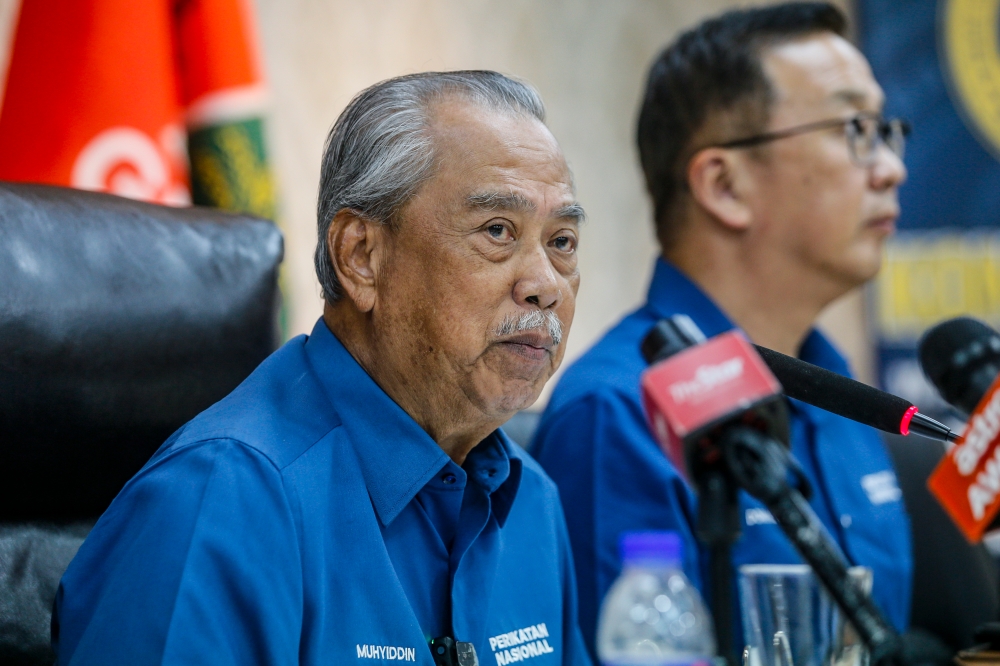
What we know so far: Fate of the six rogue ex-Bersatu MPs

Parti Pribumi Bersatu Malaysia in March this year approved an amendment to its party constitution, in order to close a ‘loophole’ where six MPs voiced support for rival politician Prime Minister Datuk Seri Anwar Ibrahim without leaving the party. — Picture by Hari Anggara
Thursday, 11 Jul 2024 7:00 AM MYT
KUALA LUMPUR, July 11 — On Tuesday, Dewan Rakyat Speaker Tan Sri Johari Abdul declared that six former Parti Pribumi Bersatu Malaysia MPs had not vacated their seats despite being kicked out of the party, much to the ire of party president Tan Sri Muhyiddin Yassin yesterday.
But why does Bersatu want these MPs out? According to the party:
Thursday, 11 Jul 2024 7:00 AM MYT
KUALA LUMPUR, July 11 — On Tuesday, Dewan Rakyat Speaker Tan Sri Johari Abdul declared that six former Parti Pribumi Bersatu Malaysia MPs had not vacated their seats despite being kicked out of the party, much to the ire of party president Tan Sri Muhyiddin Yassin yesterday.
But why does Bersatu want these MPs out? According to the party:
- The six MPs have gone rogue.
- Despite winning the 15th general election in November 2022 as Bersatu members, they are now giving their support to Prime Minister Datuk Seri Anwar Ibrahim.
- The MPs took this action between October 2023 and January 2024.
Who are the MPs? They are:
- Datuk Suhaili Abdul Rahman (Labuan)
- Datuk Syed Abu Hussin Hafiz Syed Abdul Fasal (Bukit Gantang)
- Zahari Kechik (Jeli)
- Mohd Azizi Abu Naim (Gua Musang)
- Datuk Iskandar Dzulkarnain Abdul Khalid (Kuala Kangsar)
- Datuk Dr Zulkafperi Hanapi (Tanjong Karang)
Suhaili was suspended as a party member on November 7, 2023, but was kicked out on May 17 this year for challenging his suspension in court.
Meanwhile, the other five were sent notices that they were kicked out on June 12 under a new Bersatu rule to plug a party membership. They were said to have failed to respond to the Bersatu supreme leadership council's written order to pledge allegiance to Bersatu.

File picture of a supporter installing Bersatu flags in Ayer Hitam in Johor ahead of the 14th general election, April 5, 2018. — Picture by Firdaus Latif
How Malaysia’s attempt to prevent MPs from jumping ship created a loophole, and how Bersatu fixed this
This drama is an indirect consequence of Malaysia’s “anti-hopping law” which took effect in October 2022, with the introduction of Article 49A into the Federal Constitution to discourage elected MPs from switching parties after election.
Among other things, Article 49A says an MP will stop becoming an MP and his parliamentary seat will go vacant and there will have to be fresh elections, if the MP “resigns” or “ceases to be” his party’s member.
But Article 49A also says if the party expels an MP as a party member, he will not lose his status as an MP.
Afterwards, even though the six MPs backed Anwar, they did not quit as Bersatu members or join other political parties.
This allowed them to exploit a “loophole” in both Malaysia’s anti-hopping law and Bersatu’s existing party rules: Since the six remained as Bersatu’s members, they could also keep their seats as MPs. Bersatu could not make the six MPs lose their seats by expelling them, due to what Article 49A says.
So in March 2024, to plug its own “loophole”, Bersatu added this new party rule: MPs who do not obey the party’s written orders to them will immediately cease being party members. (The Registrar of Societies (RoS) approved this new rule which took effect from April 1 onwards.)

How Malaysia’s attempt to prevent MPs from jumping ship created a loophole, and how Bersatu fixed this
This drama is an indirect consequence of Malaysia’s “anti-hopping law” which took effect in October 2022, with the introduction of Article 49A into the Federal Constitution to discourage elected MPs from switching parties after election.
Among other things, Article 49A says an MP will stop becoming an MP and his parliamentary seat will go vacant and there will have to be fresh elections, if the MP “resigns” or “ceases to be” his party’s member.
But Article 49A also says if the party expels an MP as a party member, he will not lose his status as an MP.
Afterwards, even though the six MPs backed Anwar, they did not quit as Bersatu members or join other political parties.
This allowed them to exploit a “loophole” in both Malaysia’s anti-hopping law and Bersatu’s existing party rules: Since the six remained as Bersatu’s members, they could also keep their seats as MPs. Bersatu could not make the six MPs lose their seats by expelling them, due to what Article 49A says.
So in March 2024, to plug its own “loophole”, Bersatu added this new party rule: MPs who do not obey the party’s written orders to them will immediately cease being party members. (The Registrar of Societies (RoS) approved this new rule which took effect from April 1 onwards.)

Perikatan Nasional (PN) chairman and Bersatu president Tan Sri Muhyiddin Yassin said Bersatu will appoint legal experts to take the appropriate steps to uphold the Federal Constitution and party constitution, and that legal action will be filed to contest the Speaker’s ruling if necessary. — Picture by Hari Anggara
So why has Bersatu yet to succeed in getting the six to lose their MP status?
Under Article 49A(1)(a)(ii) of the Federal Constitution:
So why has Bersatu yet to succeed in getting the six to lose their MP status?
Under Article 49A(1)(a)(ii) of the Federal Constitution:
- An MP only stops being an MP when the Dewan Rakyat Speaker announces a “casual vacancy”
- This is when that MP — who was elected when he was a member of a political party – ceases to be that party's member.
- (Under Article 160A, “casual vacancy” is when a seat in the Dewan Rakyat becomes vacant, but not because of Parliament’s dissolution).
Under Article 49A(3):
- When the Speaker receives a written notice, they should establish the casual vacancy and notify the Election Commission (EC) within 21 days.
Under Article 49A(4):
- The vacant seat has to be filled via an election within 60 days from the day the EC is notified by the Speaker.
So with that in mind, here’s the timeline of events so far:
June 20, 2024 — Bersatu chief whip Datuk Seri Ronald Kiandee said a notice on the six MPs’ vacancy has been sent to the Dewan Rakyat Speaker, and that the Speaker must declare the six seats vacant and inform the EC to enable by-elections to be held.
July 9 — In a letter, Dewan Rakyat Speaker Tan Sri Johari Abdul told Kiandee of his decision that the Labuan MP’s seat has not gone vacant under Article 49A(1) since he had filed a court case against Bersatu regarding party matters and his party membership status, and he did not want to affect the interests of those involved in the court case as it was still pending before the courts.
As for the five other MPs, the Speaker in a separate July 9 letter also told Kiandee that he had decided that their seats had not gone vacant. Why?
This is because the Speaker found that the Bersatu supreme council’s written order to the five MPs was contrary to and had denied their guaranteed rights as MPs to privilege, freedom of speech, debate and voting. He had referred to these rights as being guaranteed under the Federal Constitution, Standing Orders of the Dewan Rakyat and the Houses of Parliament (Privileges and Powers) Act 1952.

Dewan Rakyat Speaker Tan Sri Johari Abdul declared on Tuesday that six former Parti Pribumi Bersatu Malaysia MPs had not vacated their seats despite being kicked out of the party. — Picture by Shafwan Zaidon
July 10 — Perikatan Nasional (PN) chairman and Bersatu president Tan Sri Muhyiddin Yassin said the Speaker’s decision to not declare the six seats vacant was disappointing and is contrary to the Federal Constitution’s Article 49A(3) and to the law.
According to Muhyiddin:
July 10 — Perikatan Nasional (PN) chairman and Bersatu president Tan Sri Muhyiddin Yassin said the Speaker’s decision to not declare the six seats vacant was disappointing and is contrary to the Federal Constitution’s Article 49A(3) and to the law.
According to Muhyiddin:
- It was clear the six MPs were no longer Bersatu members based on the party’s rules, and Societies Act 1966’s Section 18C showed that the party’s decision can’t be challenged.
- The Speaker had acted beyond his jurisdiction in making the alleged “perverse” interpretation of the law, as only the courts have the powers to interpret the Federal Constitution.
- Bersatu will appoint legal experts to take the appropriate steps to uphold the Federal Constitution and party constitution, and that legal action will be filed to contest the Speaker’s ruling if necessary.
But wait...
If the ex-Bersatu MPs can change their allegiance to a rival and still keep their seats, what is stopping MPs from other parties potentially doing the same? For example, DAP and Umno changed their party constitutions to plug this loophole, but would they be affected by such scenarios?
This was DAP secretary-general Anthony Loke's opinion:
“It will not affect us, we have to look at the context. DAP did its party constitution amendments before GE15 took place, so all candidates who contested under DAP is bound by the provisions in the party constitution that is if they disobey and do not follow leadership orders their seat will be vacated through a notice to the Dewan Rakyat Speaker.
“That provision had existed in our party constitution before GE15 took place, so all candidates know of these provisions and they are bound by it ... This meant that when the six Bersatu MPs contested under Bersatu, they have no knowledge of the provision, therefore they are not bound by the provision.”
Would this also lead to a constitutional crisis?
Previously on June 19, Bersatu supreme council member Datuk Wan Saiful Wan Jan had suggested that this may happen if the Dewan Rakyat Speaker does not declare the six seats vacant, since there was a “precedent” with Kelantan declaring a state assemblymen’s seat vacant after the latter’s Bersatu membership was stripped.
This former state assemblyman is Mohd Azizi, who was Nenggiri representative and is also one of the six rogue MPs (Gua Musang).
No comments:
Post a Comment